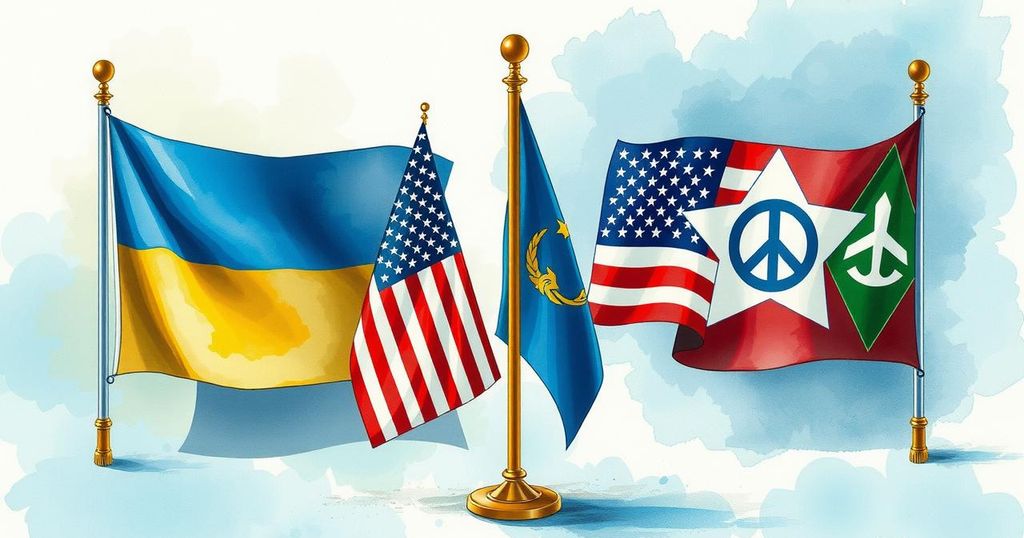Ukrainian officials will hold critical talks in Saudi Arabia with U.S. counterparts to resume military aid and intelligence-sharing. President Zelenskyy aims to negotiate a ceasefire to facilitate support from Washington, while tensions from prior discussions with Trump persist. European allies have indicated their support for Ukraine’s efforts, despite Moscow’s skepticism.
Ukrainian officials are scheduled to engage in crucial discussions with their U.S. counterparts in Saudi Arabia, focused on resuming intelligence-sharing and military support previously halted by the Trump administration. President Volodymyr Zelenskyy is poised to emphasize Kyiv’s readiness for expedited negotiations to conclude the ongoing conflict with Russia, as reported by officials familiar with the preparations.
In an effort to secure renewed U.S. backing, Ukrainian negotiators are proposing a partial ceasefire that would encompass limitations on long-range drone and missile assaults, as well as combat operations in the Black Sea. These discussions follow Ukraine’s withdrawal from Russian-held territories in the Kursk region, highlighting the impact of the cessation of U.S. aid. Kyiv aims to repair its relationship with Washington, believing that progress in ceasefire negotiations is critical for regaining military and intelligence support.
President Zelenskyy is set to arrive in Saudi Arabia for an audience with Crown Prince Mohammed bin Salman before formal negotiations commence. Andriy Yermak, head of Zelenskyy’s office, will head the Ukrainian delegation, which includes high-ranking officials such as Foreign Minister Andriy Sybiha and Defence Minister Rustem Umerov. U.S. Secretary of State Marco Rubio will represent the U.S. interest in these discussions from Monday through Wednesday, tasked with facilitating steps toward resolving the Russia-Ukraine conflict.
Tensions arose following a White House meeting on February 28, where disagreements regarding Ukraine’s war strategy led to strained relations between Trump and Zelenskyy. Ukrainian leaders have since adjusted their strategy, adopting a more conciliatory posture to regain U.S. support. However, Trump remains hesitant to resume military assistance, stating during a Fox News interview his expectation of a U.S.-Ukraine minerals agreement, yet acknowledging that such a deal alone would not reactivate military aid.
European allies have expressed their backing for Ukraine’s diplomatic initiatives. European Commission President Ursula von der Leyen noted that Brussels and Kyiv are collaborating closely. A coalition of approximately 20 nations, led by the UK and France, is reportedly evaluating options to continue their support for Ukraine contingent upon a potential ceasefire, although Trump has not yet indicated support for such initiatives.
To bolster U.S. assistance, Ukraine has introduced a stepwise ceasefire framework. This plan intends to commence with a halt on aerial attacks and naval operations, cessation of strikes on essential infrastructure followed by prisoner exchanges, and the return of Ukrainian children taken to Russia. Nonetheless, Moscow remains doubtful, with Russian Foreign Ministry spokesperson Maria Zakharova rejecting Ukraine’s overtures for respite without a conclusive settlement.
The ongoing discussions between U.S. and Ukrainian officials in Saudi Arabia reflect Ukraine’s strategic efforts to restore military aid and intelligence-sharing, following disruptions from the previous U.S. administration. Proposed frameworks for a ceasefire and diplomatic concessions showcase Ukraine’s approach to regaining U.S. support. The support from European allies indicates a united front in addressing the conflict, although skepticism from Moscow presents challenges.
Original Source: www.firstpost.com




